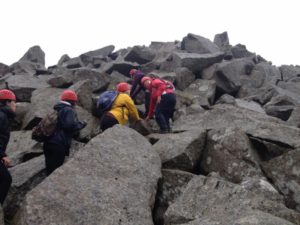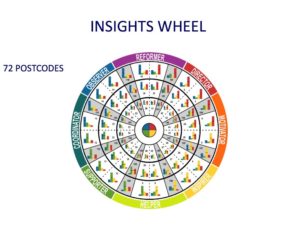Lessons learned from a team training day and how we’re applying them in our business
Too busy with clients and customers to focus on your own team? It’s a false economy. A productive, effective team = quality work, happy clients, a reputation to be proud of and a more profitable business. Well that’s what we think anyway.
That’s why Absolute’s intrepid team recently braved a wet, misty (yet stunningly beautiful) Dartmoor for a training day with Jack Russell Coaching.
Leaving not a minute spare, Jack and his team had us wearing blindfolds, building with planks, clambering up steep rocky inclines, abseiling, climbing and wild swimming.

It was great fun, a chance to get out of the office and shake off the usual shackles to our keyboards and phones … but what did we learn? And how will we ensure that those eight hours make a real difference to our business for the next eight days, weeks and years?
Lesson 1: understanding how people like to be communicated with, means you can work together much more effectively. That goes for clients and colleagues.
The crux of everything we’ve learned from Jack so far has been around communication. Prior to the team day we each received an Insights Discovery profile which, in a nutshell, looks at four typical personality types in our team members and identified our positions on an Insights Discovery Wheel. Rather than pigeonholing us into types, these insights are designed to help us to communicate with people that might be quite different from ourselves. In other words: ‘treat others how they’d like to be treated, not how you’d like to be treated’.
Just because you like to have lots of detail upfront and spend time analysing a situation doesn’t mean that your client/colleague/supplier wouldn’t rather get the top line facts and press ahead quickly with a gut-instinct decision. Or maybe you prefer to deliver critiques with a softly-softly approach (as you’d like to receive them)? Well, the person who’s receiving the feedback might actually be dying to tell you to just get to the point.
In our agency (or any kind of professional service), part of our role is to balance the need to adapt to each of our clients’ requirements while remaining objective advisors and retaining our own business identity. As much as we want all our clients to feel like we’re an integral part of their team, the way in which we do that needs to be different in every case. It’s up to us to work out how the people we deal with on a day-to-day basis (clients, journalists, partners, suppliers, each other) prefer to be communicated with and be respectful of that, working harder to adapt our style of communication to suit the recipient.
The training day certainly highlighted the range of personalities and preferences we have in team Absolute and that’s a hugely positive thing, but we do need to be mindful of our different styles. It’s not just our clients that we can improve communications with.
Lesson 2: as well as communication preferences, different personality types have strengths and weaknesses. If we understand these we can utilise strengths and develop weaknesses to enhance our team.
Some of the language used in Insights Discovery is quite strong, emotive and at times uncomfortable. That’s because it’s often describing an extreme version of a certain personality type. It can also be quite challenging because it talks about how other people could perceive you and how this turns into strengths and weaknesses of character.
What it’s shown up in Absolute’s case is that we have a fairly broad spectrum of strengths, some of which we’re not currently utilising to maximum potential. This is an eye opener because in a small team we are well placed to share responsibilities and don’t need to pigeonhole people into certain roles or job titles. There’s really no such thing as a hidden strength because it’s only a strength if it’s making something stronger.
Lesson 3: to become an expert at something you need to practice it everyday – that includes changing the way we look at the world and how we communicate.
It’s no good absorbing all these fantastic insights from a training day, then coming down off the high and forgetting all about them.
To become an expert at something you need to do it 10,000 times for 10,000 hours over ten years. That doesn’t just apply to sports people, it can apply in business too. If we know what we need to do to communicate better, motivate ourselves and be more positive, then we need to practice doing these things every single day.
For example, Jack visibly demonstrated to us how negative language can affect our bodies in a negative way, yet it’s ingrained in most of us to use it. Who answers ‘not too bad’ when asked how you are, or ‘not a problem’ when asked to do something? Why not ‘well, thank you’ or ‘I’d be pleased to help’? Why introduce the words ‘bad’ and ‘problem’ when you’re actually trying to be positive?
It’s not human nature to be negative – language is learned behaviour – but with practice we can become experts at being positive; at communicating with each other; at being the best team that we can be – which is our ultimate goal.

We’re looking forward to more sessions with Jack and his team in the future, so watch this space!
If you’d like to know more about Insights Discovery, contact Jack Russell Coaching www.jackrussellcoaching.co.uk